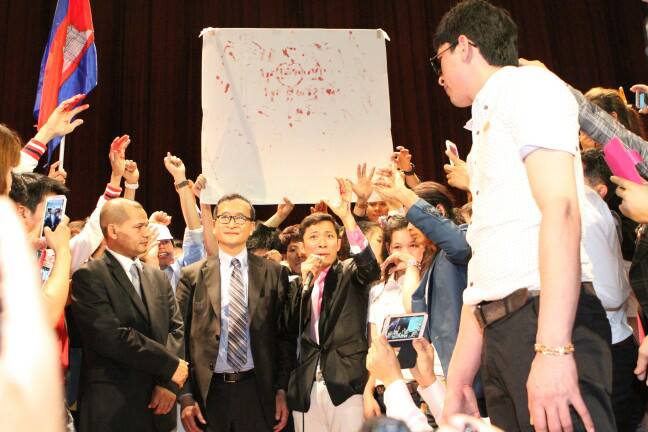Cambodian Youths in South Korea and their Cry for Change

Courtesy of facebook’s Phanit’s profile
Many people were impressed by the political involvement of the Khmer youths from South Korea. In fact, the greeting ceremony of the political dignitaries especially Sam Rainsy who is the president of the Cambodia National Rescue Party (CNRP) on June 2nd 2013 surprised people extremely through the news and social media. Among those welcoming activities, one of the performing groups used blade to cut the finger to get blood in order to write short phrases on the white board such as “we love Khmer motherland”, “Khmers Love Khmers” and “Khmer leaders must be honest and ethical”.
This bravery act has surprised the Cambodian people worldwide. While a local pro-government media wrote that Sam Rainsy stirred up the youths to bleed their blood for that cause, the youths who were actively involving with the event organizing claimed through the video clip on facebook that the bleeding of blood to be used for those phrases was made by volunteering, not from any provoking.
According to the Ministry of Labor and Vocational Training of Cambodia, in over 5 months of 2012 there were 4,998 workers were out of the country to legally work in South Korea and the number of Cambodian workers migrating to Korea has been significantly increasing. Many years ago, the owners of Korean enterprises have satisfied with the endurance and work performance of Cambodian workers comparing to other 15 nations. Thus, the demand for Cambodian workers has been doubled while the condition of working and compensation is better than other countries Cambodian workers have been immigrating to.
Now, there are approximate 30,000 Cambodian workers are working in South Korea. Those workers are shifting in different sectors such as service, factory, agriculture, construction and handicraft in accordance to their language proficiency and skills. Their wage is claimed ranging from 1200 to 2800 dollars per month. As the result, many Cambodian parents whose children went to work in South Korea, the level of living standard has been visibly elevated comparing to other families within the same community.
The political fever of Cambodian workers in South Korea this time is a manifestation of their cry for a change in Cambodia. Their voice and passion are likely representing the mentality of Khmer youths throughout the world. Change has been traditionally resistant in Cambodian society. Analysts have agreed that previous elections, the elders can shape the pattern of thinking and voting decision of the electorates especially their children. But at the present, the trend has been tremendously reversed. The young members of the family whose ages are older than 18 years old have influenced the elders to decide their ballot casting. The trend is possibly caused by the capacity of those youths are quipped in both knowledge they learned from new technology and financial support they provided to the family.
Statistics show that the garment factories in Cambodia have employed up to 350,000 workers entire the country and if totalizing with those migrating youths working outside the country, those total half million of youths can influence more than one million electorates are the front-liners to vote for change in Cambodia. This calculation doesn’t include those aged under 25 years old who are representing majority of Cambodian population. Both opposition and ruling party are affected by these new emerging electorates and their policy has been visibly adapted to the need of those youngsters. However, the cry for change and the support towards the Cambodia National Rescue Party from those youngsters in South Korea is an alarming bell as the Election Day on 28 July 2013 is fast approaching.
By Sophoan Seng
An Independent Consultant for “Leadership Skills”
